2000
January 1, 2000 - Experts feared the collapse of Bosnia-Herzegovina's economy as foreign aid was expected to be cut in half by the end of the new year.Billions of dollars were already invested after the 1995 Dayton accords. According to the government's statistics office, unemployment in the Muslim and Croat part of the country was standing at about 70 percent.
January 4, 2000 - In Croatia's parliamentary elections, a center-left opposition coalition — led by ex-communist and former dissident Drazen Budisa — headed toward victory, indicating the end of Tudjman's party's nine-year grip on power, that started in 1991 when Croatia became independent. The turnout — some 76 percent — was a near record.
Presidential elections were scheduled for January 24. The moderate Foreign Minister Mate Granic was also considered one of the favorites.
January 5, 2000 - At Eagle Base, Tuzla, a US Army soldier died of a gunshot wound.
January 10, 2000 - In Croatia, Foreign Minister Mate Granic was given 23.8 percent of the vote from 450 respondents; Drazen Budisa — leader of the Social Liberal Party — 22.7 percent.
January 12, 2000 - The UN Security Council demanded that the three presidents of Bosnia would fully implement the "New York Declaration" that was reached on November 15, 1999, on cooperation and implementation of the Dayton peace process. Mistrust among the groups, who fought a 31/2-year war, has kept over a million refugees from returning to their prewar homes. Two weeks after the agreement, Zivko Radisic stated the declaration was an "expression of the will", not a binding commitment, an interpretation that was obviously not shared with the UN.
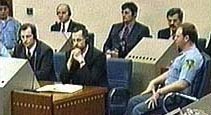
[Image: Reuters]
January 14, 2000: In The Hague, five
Bosnian Croats were found guilty of
war crimes
January 14, 2000 - The International Criminal Tribunal for the former Yugoslavia found five Bosnian Croats guilty of the murders of 116 Muslim men, women and children near the central Bosnian village of Ahmici in April 1993, during the Bosnian war. The former commander of the unit was sentenced to 25 years for organizing the murders. The others were sentenced to 15, 10, 8, and 6 years imprisonment. A sixth suspect was set free.
January 25, 2000 - NATO peacekeepers arrested suspected war criminal Mitar Vasiljevic in Visegrad.
January 26, 2000 - After nearly four years of hearings, appeals and cross-appeals, the UN tribunal sentenced the Bosnian Serb Dusko Tadic to 20 years imprisonment. He was arrested February 13, 1994, by German police in Munich.
February 8, 2000 - Stipe Mesic, a former close aide to the late President Franjo Tudjman who pledged to distance Croatia from its authoritarian past was elected as the second president. He emphasized that Croatia was to become a genuinely democratic society.
February 18, 2000 - Stipe Mesic took his presidential oath.
February 20, 2000 - The Serb Socialist Party quit the ruling coalition in the Serb half of Bosnia, weakening pro-Western Premier Milorad Dodik's support in parliament. Bosnian members of Yugoslav President Slobodan Milosevic's party, announced their departure after Dodik fired two party officials.
February 21, 2000 - Forensic experts collected the remains of what they believe were seven victims from Srebrenica — the Muslim enclave overrun by Bosnian Serb forces in July 1995. More than 7,000 Muslims, most of them men, were missing afterward, and most are believed to have been massacred. Some 2,000 bodies have been found so far.
February 22, 2000 - Four Socialist Party members from the ruling coalition in the Serb half of Bosnia handed in their resignations, but pro-Western premier Dodik refused to accept them. The Socialists were upset because Dodik fired two party officials.
March 4, 2000 - Croat General Tihomir Blaski was sentenced to 45 years of imprisonment by the international tribunal. He was found guilty of ordering an "ethnic cleansing" campaign against Muslim villages in central Bosnia. Members of Croatia's newly elected, pro-Western government criticized the verdict.
March 9, 2000 - Bosnian Serb prime minister Milorad Dodik and Croatian foreign minister Tonino Picula told US secretary of state Albright they would submit legislation to their parliaments within three months to enable refugees to return to areas under the control of rival ethnic groups. As a sign of good will, both sides agreed to let 4,000 Bosnian Croat and Croatian Serb refugees return home before the three-month deadline.
March 13, 2000 - In The Hague, the trial opened of the highest-ranking Serb to go before a tribunal on genocide charges. Bosnian Serb General Radislav Krstic was charged with the July 1995 slaughter of at least 7,500 Muslim men and boys at Srebrenica.
March 15, 2000 - US Ambassador Thomas Miller and a half dozen other western diplomats visiting Bosnia, made pledges of support for refugees. Their visit was an effort to assess progress in returning refugees.
March 21, 2000 - After delaying more than two years, Croatia handed over a prominent Bosnian Croat war crimes suspect to the UN tribunal to face charges for atrocities allegedly committed against Muslims during the Bosnian war. Mladen Naletilic was indicted on 17 counts of war crimes for his alleged role as commander of a gang of convicts who terrorized Muslims in southwestern Bosnia in 1993 and 1994 in a campaign to drive non-Croats from the area. The extradition was seen as a test case of the new government's commitment.
March 24, 2000 - In an effort to improve relations since the change of Croatian leadership, Croatia and Bosnia agreed to get trains rolling again across their border. The UN said there was still powerful resistance from nationalists determined to preserve ethnic divisions.
March 28, 2000 -
An advisor to Alija Izetbegovic — the Muslim representative of Bosnia's joint presidency — said tens of thousands of Bosnian refugees could return home this year if the international community would cut through bureaucracy and supply them with homebuilding materials. Assistant Secretary-General Hedi Annabi said progress on implementing the 1995 accord has been slow and met powerful resistance from nationalists determined to preserve ethnic divisions.
March 30, 2000 - International donors promised $2.4 billion to revitalize Bosnia's economy. Some 35 projects will be financed, including the repair and construction of roads, bridges, power-grids and water supply networks. In return for the international help, Albania, Bosnia, Bulgaria, Croatia, Macedonia and Romania have committed to democracy and economic changes to attract private investment.
April 1, 2000 - The Vice President of Bosnia's Serb republic — Mirko Sarovic — said wartime Bosnian Serb Radovan Karadzic had no longer any influence on the Serb Democratic Party (SDP), set up by Karadzic in 1990. Political analysts were sceptic. Karadzic was indicted twice by the UN's International Criminal Tribunal for former Yugoslavia (ICTY) for war crimes during the 1992-1995 Bosnian conflict, including the siege of Sarajevo and the massacre of Muslim men in Srebrenica.
Croatia's president Stipe Mesic said another war in the Balkans would be possible, unless the West takes steps to stop Milosevic.
April 3, 2000 - French troops detained Momcilo Krajisnik, president of the Bosnian Serb Assembly between October 1991 and November 1995 and aid to former Bosnian Serb leader Radovan Karadzic. He was transferred to the war crimes tribunal in the Netherlands. It was the highest-ranking suspect arrested so far. NATO Secretary-General Robertson said he was "accused of genocide, crimes against humanity, violations of the laws and customs of war and grave breaches of the Geneva Convention, including murder, willful killing, extermination, complicity in genocide, deportation and inhumane acts". His indictment had not been made public. (See ICTY press release.)
Krajisnik signed the Dayton deal but afterward advocated Serb secession from Bosnia.
April 5, 2000 - The wife of war crimes suspect and former Bosnian Serb president Radovan Karadzic appeared at a rally of the hard-line Serb party -– an effort said to boost its chances of a comeback in the municipal elections.
The UN court ordered the release of war crimes suspects Miroslav Tadic and Simo Zaric because they had been awaiting their trial for two years. However, the order was frozen by chief prosecutor Carla Del Ponte. The suspects were accused of crimes against humanity in an "ethnic cleansing" campaign in the town of Bosanski Samac in early part of the 1992-95 Bosnian war. With nearly 40 suspects awaiting a trial, the court was struggling with a backlog of cases.
April 7, 2000 - The Croatian new government sent a clear signal to the world that it is serious in its attempt to weed out corruption. A university lecturer was accused of taking bribes and a city clerk was arrested for collecting fees while posing as the head of the construction permit issuing office. But also widely known figures as former tourism minister Ivan Herak was arrested for embezzling $1.5 million in government funds and Stipe Gabric, the mayor of Metkovic, were arrested. Former deputy transport minister Zvonimir Vedris was also arrested; he allegedly pocketed $2.5 million from funds while an adviser for development projects that existed only on paper.
April 8, 2000 - Around 2.5 million eligible voters in Bosnia chose between one of seven coalitions, 68 parties and 18 independent candidates in almost 150 municipalities across the country. The votes were the second municipal elections since the end of the war.
Srebrenica could not take part since previous election results were never implemented after local Serbs refused to accept them. Voting in Srebrenica was scheduled for October.
April 9, 2000 - The Croatian government gave experts from the international war crimes tribunal permission to examine an alleged mass grave near Gospic — 60 miles southwest of the capital Zagreb. Late president Tudjman refused cooperation.
April 10, 2000 - Early figures showed the Serb Democratic Party — once headed by war crimes suspect Radovan Karadzic — was winning the most votes in the Serb half of Bosnia. The Croats voted also largely for nationalists who led them during the 1992-95 war. Western officials considered the grip of three nationalist parties as the main obstacle to progress in Bosnia.
April 11, 2000 - Three children died in a minefield on the outskirts of Sarajevo.
April 20, 2000 - Radovan Karadzic — fugitive wartime leader of Bosnia's Serbs — is roaming between several Serb-held towns in eastern Bosnia to avoid arrest, according to the Slobodna Bosna weekly. Karadzic — indicted twice by the UN tribunal — is said to be surrounded by 80 bodyguards.
April 22, 2000 - SFOR troops arrested Bosnian Serb war crimes suspect Dragan Nikolic in the US sector of Bosnia-Herzegovina. He was immediately sent to the tribunal in the Netherlands. Nikolic was the former commander of the Susica prison camp for Bosnian Muslims near Vlasenica. He was indicted by the tribunal in November 1994 and was the first suspect ever indicted by the UN court. (See May 6, 2000.)
April 25, 2000 - NATO's departing commander Clark warned Yugoslav President Slobodan Milosevic against "tightening the noose" on Montenegro.
April 28, 2000 - The Muslim Commission for Missing Persons has exhumed 83 bodies — believed to be Bosnian Muslims from Srebrenica killed by Serb soldiers in July 1995 — from several mass graves in eastern Bosnia.
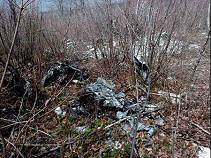
[Image: Associated Press]
Wreck of USAF Capt. O'Grady's
F-16, shot down June 2, 1995.
The wreck of a USAF F-16C that was shot down over Bosnia by a Bosnian Serb anti-aircraft missile on June 2, 1995, was recovered during mine clearing operations near the town of Drvar — some 100 miles northwest of Sarajevo. USAF Captain Scott O'Grady was rescued by a US combat rescue team six days later.
May 6, 2000 - In Bosnia, the remains of four members of a Bosnian family were exhumed as part of the war crimes trial of three Muslim policemen charged with killing them. The policemen are on trial before the cantonal court in Mostar. They were originally charged with murder, but after permission of the UN war crimes tribunal in The Hague the charges were changed to those of war crimes killings.
Witnesses stated that war crimes suspect Dragan Nikolic — arrested April 22, 2000 — was not arrested in the US sector in Bosnia, but rather in Serbia, Yugoslavia. NATO and UN tribunal officials always denied penetrating Yugoslavia's borders to catch fugitive war crimes suspects but the reported clandestine operation could reflect an aggressive new stance, as officials vowed war criminals will find no safe refuge. The matter alarmed many war crimes suspects in Yugoslavia — Serbia refused to hand over any war crimes suspect.
Apparently, it was not the first time. In September 1998, war crimes suspect Stevan Todorovic always insisted he was abducted from Zlatibor Mountain in central Serbia by a secret commando group and taken by boat across the Drina River into Bosnia.
May 13, 2000 - The United States suspended assistance for the Bosnian Croat military because of its failure to speed up integration into a joint Muslim-Croat army. Under the $400 million US military aid program, the federation received weapons, other military equipment and training from the US and Islamic countries. The program was suspended by the US in 1998 and 1999 over the slow pace in the unification of the Muslim-Croat military but was renewed in August 1999.
Forty-three people were killed when a bus carrying Muslim pilgrims plunged into a river near the town of Kakanj — some 30 miles northwest of Sarajevo.
May 18, 2000 - The International Commission for Missing Persons (ICMP) said it would help set up a DNA lab to speed up identification of thousands of missing since the 1995 massacre of Muslim men in Srebrenica — the first large-scale DNA testing ever. Some 8,000 Bosnian Muslim men are believed to have been slaughtered in July 1995 by separatist Bosnian Serb forces.
May 25, 2000 - The former Yugoslav republic of Croatia joined the NATO Partnership for Peace program in a step toward bringing the country into the European mainstream. The program arranges for joint exercises, preparation of peacekeeping missions and holds regular political meetings.
May 31, 2000 - The Bosnian Serb commission for missing persons began searching for bodies of Serbs who were allegedly killed and thrown into a hillside crevice above Sarajevo by Bosnian Muslims during the 1992-95 war. The commission had begun preliminary work to determine whether ground disturbances that had been observed at the site were a result of seismic or human activity.
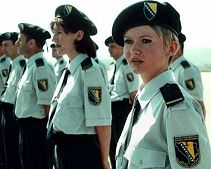
[Image: Associated Press]
June 6, 2000: Inauguration of the first
85 men and women of Bosnia's State
Border Service, composed of all three
ethnic Bosnian groups.
June 8, 2000 - Former Bosnian Serb paramilitary commander Ljubisa Savic was shot dead in Bijeljina. Attackers fired at his car and then took off.
Forty bodies were exhumed from several mass graves in Bosnian Serb-controlled territory — near the Serb-held town of Foca, some 22 miles southeast of Sarajevo. The bodies were believed to be Bosnian Muslims killed by Serb soldiers in the beginning of the Bosnian 1992-95 war.
June 14, 2000 - The Commission on Security and Cooperation in Europe said there was insufficient progress in implementing the Dayton Agreement. They called for the arrest and prosecution of those indicted for war crimes, crimes against humanity and genocide, including Bosnian Serb extremist leader Radovan Karadzic, his military sidekick Ratko Mladic and Yugoslav President Slobodan Milosevic, the mastermind of the conflict. Former Supreme Allied Commander Europe, US Army General Clark, said that the risks of apprehending individuals had been overestimated.
June 15, 2000 - A bomb explosion destroyed the car of the Bosnian Serb education minister, Nenad Suzic, in Banja Luka. Five other vehicles were damaged, but casualties were reported.
June 16, 2000 - Bosnian Serb police arrested five people suspected in a car-bomb attack that critically wounded a journalist in October 1999. The journalist wrote articles alleging Serb soldiers committed atrocities against Muslims during the Bosnian war. Two businessmen received similar threatening letters to the one the journalist received, leading the police to the suspects.
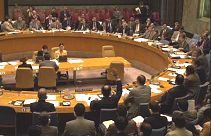
[Image: Associated Press]
June 21, 2000: Russian Ambassador
Sergey Lavrov was the sole
abstention on a vote on extending
the NATO-led peacekeeping force
and the UN mission in Bosnia
for another year.
June 21, 2000 - The UN Security Council voted to keep the NATO-led peacekeeping force and the UN mission in Bosnia for another year. Russia abstained to protest Yugoslavia's exclusion from a 46-nation meeting on Bosnia. China voted in favor, but disapproved the isolation of Yugoslavia.
The council approved the resolution by a vote of 14-0 stating that "the situation in the region continues to constitute a threat to international peace and security." The council also supported the 3,400-strong UN mission in Bosnia, which helps oversee some civilian components of the Dayton pact, including the return of refugees and the building of government institutions.
June 23, 2000 - Bosnia approved a new multiethnic government — six months after the previous government was declared illegal because it had two prime ministers. It took Bosnia's three-member presidency half a year to come up with a new candidate, Tusevljak, an obscure Serb economics professor. International officials hinted that if they become unsatisfied with the work of the new prime minister — a publicly unknown figure — he might be removed.
June 25, 2000 - In the Bosnian-Serb town of Prijedor British peacekeepers arrested Dusko Sikirica — a leading Serb war crimes suspect accused of massacring Muslim and Croat prisoners while he commanded the notorious Keraterm prison camp during the Bosnian war. He was indicted by the UN war crimes tribunal in The Hague in July 1995 for crimes against humanity, war crimes and other offenses. The same day he was flown to Valkenburg military airfield in the Netherlands and transferred to the Scheveningen detention facility in The Hague.
June 26, 2000 - The US condemned measures taken by Bosnian federation authorities against the Bosnian newspaper Dnevni Avaz. Tax police raided the newspaper's premises several times and the tax authorities froze its bank accounts for several days.
June 30, 2000 - The president of Bosnia's Muslim-Croat federation, Ejup Ganic, appealed for $1 billion in aid or soft loans to help rebuild homes destroyed in the 1992-1995 war and let refugees return to their homes. He outlined a plan in which the international community — supported by the United States, the European Union, and World Bank — would draw up a loan scheme to be repaid over 20 or 30 years.
July 5, 2000 - War crimes investigators completed exhumations of mass graves in northwest Bosnia. They expected to issue new indictments in connection with the 1995 massacre at the Muslim enclave of Srebrenica — but UN prosecutors said they are dealing with delays in the forensic investigations.
July 7, 2000 - In a report by the General Accounting Office (US) it was said that widespread crime and corruption thwarted implementation of the Dayton peace accord. It was suggested the White House should consider suspending US aid until steps are taken. The report also expressed concern that most of some $407 million committed by international donors to provide general budget support to Bosnian governments were not controlled or audited.
July 10, 2000 - Secretary-General Kofi Annan said the United Nations' failure to help save thousands of Bosnian Muslims from a Serb mass murder will forever haunt the world body. Starting July 11, 1995, just a few months before the end of the 31/2-year war, Bosnian Serb forces overran the eastern town, which was designated a UN-protected zone. When the slaughter was finished, as many as 8,000 men and boys older than 14 were missing. The remains of some 2,500 have been exhumed.
July 11, 2000 - Bosnia's UN ambassador, Muhamed Sacirbey, implicated top international negotiator Carl Bildt in the failure to defend the UN "safe haven" of Srebrenica. At that time Sacirbey was Bosnia's foreign minster. He recalled that Bildt told him on July 11, 1995, there were no plans to defend or liberate Srebrenica or defend Zepa. Bildt reiterated that the Security Council was primarily to blame for not providing enough troops to defend the enclave in eastern Bosnia. "If the UN had been given an army on the ground by its member states, everything would have been different. But the UN was given words, and they didn't count for much in the brutality of the Bosnian war."
Srebrenica's inhabitants believed that the presence of 150 Dutch UN peacekeepers and the might of NATO airpower would ensure their safety. But NATO never responded to repeated Dutch requests for airstrikes, and the peacekeepers failed to prevent the Serb massacres.
July 20, 2000 - Bosnian police removed roadblocks near Bocinja set up by Muslim refugees. They were due to be evicted from Serb-owned houses.
July 21, 2000 - The Yugoslav war crimes tribunal upheld a landmark ruling that established rape as a war crime. It rejected an appeal by former Bosnian Croat commander Anto Furunzija convicted of watching as a subordinate tortured and raped a female prisoner. He received a 10-year sentence for the attack. The subordinate soldier was indicted but not captured.
The conviction set two international legal precedents: the tribunal admitted the testimony of the victim; and it expanded the definition of sexual assault to be more easily punishable as an act of torture.
July 28, 2000 - According to the Irish police missiles, machine guns and explosives that were seized in Croatia earlier were believed to have been destined for IRA guerrillas opposed to the Northern Ireland peace process. The arms were intercepted in the port city of Split.
July 29, 2000 - More than 5,000 Muslim refugees from eastern Bosnia demonstrated, demanding to be allowed to return to their homes. The 1995 Dayton Peace Agreement ordered the return of all refugees but implementation has been very slow.
August 3, 2000 - A United States military attache to Bosnia presented himself for the first time to the Serb, Croat and Muslim members of the Standing Committee for Military Matters (SCMM). By presenting the credentials to the body, the US supported the SCMM and tried to give it international significance.
Western countries that have spent billions of dollars to assist Bosnia's peace process were pressuring its leaders to begin a serious restructuring of the military, saying Bosnia could not afford to have two separate armies. Bosnian Serbs strongly opposed the unification of the two armies but they have agreed to give more powers to the SCMM and to make further cutbacks in the military.
August 5, 2000 - Former interior minister Alija Delimustafic and part-owner of a bank in which the US government lost $900,000 was arrested. In a report released last month, the US General Accounting Office said the US government had not recovered $900,000 in US embassy operating funds and loan payments which were deposited in the bank.
In Vares — 25 miles north of Sarajevo — UN police and SFOR peacekeepers raided a police station, seizing prohibited materials, including weapons, equipment and documents in a move to control activities of local authorities.
August 7, 2000 - The UN said it will train Bosnia's Muslim, Croat and Serb officers together as UN military observers to boost cooperation between the two ethnically divided armies. Jacques Klein, head of the UN mission in Bosnia said it was important to bring officers from the two armies to train and work together, because they can help later in the establishment of a future national defense structure.
August 15, 2000 - The Netherlands' UN ambassador, Peter van Walsum, that Bosnia's loss of $500 million in revenue to smugglers is so large that high-level government officials must be involved.
August 19, 2000 - Twenty-seven bodies were exhumed from a mass grave found earlier that week in the Serb-controlled part of Bosnia. Officials believed the remains were Bosnian Muslims from the eastern town of Visegrad, brought to the area by bus and executed by Serb soldiers at the beginning of the 1992-1995 war.
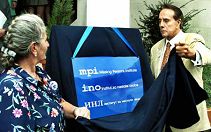
[Image: AP]
September 6, 2000: Opening of the
Missing Persons Institute in
Sarajevo.
August 28, 2000 - Bob Dole, head of the International Commission for Missing Persons (ICMP), opened the Missing Persons Institute (MPI) for former Yugoslavia in Sarajevo which will help trace the fate of thousands of Bosnians missing since the 1992-95 war. ICMP estimated that between 20,000 and 30,000 Bosnian Muslims, Serbs and Croats are still unaccounted for. MPI's objectives were to intensify governments' efforts to release information on the whereabouts of the missing.
August 30, 2000 - A former Croat soldier who provided evidence on comrades suspected of murdering Serbs, was killed Monday in an explosion outside his home in Gospic, Croatia. The UN tribunal said that the apparent murder of a potential witness would have a chilling effect on people considering testifying against war criminals.
September 2, 2000 - Experts exhumed more than 70 bodies so far from a mass grave near the Serb-held village of Kalimanici — 20 miles east of the Bosnian capital, Sarajevo. The bodies are believed to be of Bosnian Muslims from the eastern town of Visegrad, brought here by bus and executed by Serb soldiers at the beginning of the 1992-1995 war.
September 6, 2000 - Croatian police arrested two Croat men suspected of belonging to a group that waged a 1993 killing spree in the village of Ahmici in central Bosnia during Bosnia's war. The two were not sought by the UN war crimes tribunal. In case it comes to a trial, it would be the first time Croatia tries it citizens for war crimes committed against Muslims in Bosnia.
September 7, 2000 - The parliament of Bosnia's Serb republic passed a no-confidence motion in the government of Western-backed Prime Minister Milorad Dodik. Dodik ousted nationalist hardliners from power in 1998. General elections were scheduled for November 11. The confidence motion was initiated by the hard-liners from the Serb Democratic Party.
September 8, 2000 - A war crimes suspect turned himself in to the Mostar police. He was a member of "The Mostar Five" — a group charged with committing war crimes against civilians and prisoners when fighting erupted between the Bosnian Muslims and Croats in 1993.
September 9, 2000 - Forensic experts in Bosnia found the remains of about 50 bodies at the Ivan Polje meadow where a local Serb said Muslims had been killed by Serb forces in 1992.
September 12, 2000 - The UN said that Bosnian Serb wartime leader and indicted war criminal Radovan Karadzic may be arrested before Bosnia's general elections in November. US president Clinton said in a statement that he wanted to see Karadzic arrested before his mandate expires in January 2001. A few days earlier, Karadzic was seen in a suburb of Sarajevo.
Croatia arrested a dozen people, including two army generals, in what appeared to be a major crackdown against those allegedly involved in wartime atrocities in Bosnia and Croatia. The arrests marked a leap forward in cooperation with the ICTY, whose requests were largely ignored under late President Franjo Tudjman.
September 13, 2000 - A Bosnian Croat charged with war crimes against Muslims in the town of Mostar in 1993 turned himself in to a regional court. Zoran Soldo was the second member of the so-called "Mostar Five" to give himself up.
September 19, 2000 - Jacques Paul Klein, head of the UN mission in Bosnia, that a Croatian army general and three Bosnian Croats arrested in police sweeps in Bosnia and Croatia last week are suspected in the assassination of Jozo Leutar, a Bosnian Croat deputy interior minister and an anti-corruption politician. Leutar was killed in a car bomb explosion in March 1999, an attack that the top Bosnian Croat leader first blamed on Muslims.
October 12, 2000 - Forensic experts said they exhumed the remains of 40 bodies from a mass grave in Slap — eastern Bosnia — believed to contain up to 150 bodies of Bosnian Muslims killed by Serb forces early in the country's 1992-95 war.
October 13, 2000 - Serbian war crimes suspect Janko Janjic detonated a hand grenade during an attempt of his arrest in Bosnia, killing himself and wounding four German SFOR soldiers. Janjic was one of four Bosnian Serb subcommanders indicted for the torture, rape and enslavement of women and girls in Foca in the summer of 1992. He was the third war crimes suspect to die while resisting arrest. It was the first time peacekeepers suffered casualties
October 14, 2000 - Alija Izetbegovic, who led Bosnian Muslims through Europe's bloodiest conflict since World War II, resigned from Bosnia's joint presidency. Izetbegovic was the last of the major national leaders who had presided over the wars that swept the former Yugoslavia after Croatia, Bosnia-Herzegovina and Slovenia declared independence starting in 1991. He turned his job over to his Serb colleague Zivko Radisic.
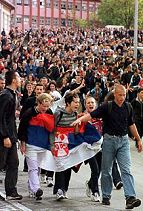
[Image: AP]
September 6, 2000: Bosnian
Serb students marched
through the streets of
Brcko, protesting against
the multi-ethnic school
program.
October 19, 2000 - Demonstrating for a third straight day, Bosnian Serb students in Brcko pelted US peacekeepers with eggs and stoned Muslim-owned businesses to press their demand that Bosnian Muslims leave the city.
October 20, 2000 - The UN war crimes tribunal issued its first subpoena to NATO. The alliance was ordered to disclose how it detained a Bosnian Serb war crimes suspect who said he was abducted illegally by mercenaries. US Army Chief of Staff General Eric Shinseki was summoned to provide evidence on the September 27, 1998, detention of Stevan Todorovic.
It was the first time the UN tribunal issued a binding order to NATO to hand over information. However, the three-judge chamber chaired by Patrick Robinson of Jamaica gave NATO the option of applying to have the order set aside "on the grounds that disclosure would prejudice national security interests."
In 1999, Todorovic submitted a motion contesting the legality of his detention, claiming he was snatched in Serbia by mercenaries who handed him over to SFOR troops at the Bosnian border.
October 22, 2000 - Yugoslav President Vojislav Kostunica visited Bosnia-Herzegovina, becoming the first Yugoslav leader to visit the country since it declared independence in 1991. In an attempt to ease tension between Belgrade and Sarajevo and establish diplomatic relations, Kostunica had lunch with all the Bosnian Serb leaders, except pro-Western Prime Minister Milorad Dodik.
October 25, 2000 - Bosnian Serb General Radislav Krstic — on trial for genocide — told the UN tribunal that he knew about mass executions by Serb forces in July 1995 at the Muslim enclave of Srebrenica, but did not investigate them. He said he feared his chief of staff, General Ratko Mladic, would harm him or his family if he took any action.
November 9, 2000 - A report issued by the Ministry of Human Rights and Refugees said that at least 100,000 Bosnians left the former Yugoslav republic since the end of the 1992-95 war in search of work and a more secure future. Counted were only Bosnians registered with the Geneva-based International Organization for Migration (IOM). The report said some 625,850 Bosnians were living as refugees scattered in 40 different countries worldwide. Inside the country, 857,000 people are internally displaced, unable or unwilling to return to their pre-war homes. Of these, 55.3 percent are in the Muslim-Croat federation and 44.7 percent in the Serb republic.
November 12, 2000 - In Bosnia's nation-wide elections the party founded by indicted war crimes suspect Radovan Karadzic claimed a strong lead over the Western-backed candidate to lead the Bosnian Serb part of the country.
November 15, 2000 - Richard Holbrooke said he wanted a merger of the Bosnian armies. "As long as you have three armies, NATO troops will always have to be there. That was the single greatest flaw in the Dayton peace agreement." Holbrooke said the Dayton agreement also failed to ensure that the central presidency of Bosnia had adequate staff. "It made the three-person presidency an empty shell," he said.
Haris Silajdzic, leader of a reformist party and a former prime minister in Bosnia, said some of the most important points of the agreement have never been implemented, such as the return of refugees to their homes and a revitalization of Bosnia's prewar multiethnic society.
November 15, 2000 - Western officials in Bosnia punished Serb and Croat nationalists for breaking the rules in weekend elections and warned them they could face further sanctions. The OSCE which ran the polls took away 10 seats in regional assemblies from the Croatian Democratic Union (HDZ) and half the seats won by the Serb Democratic Party (SDS) in the town of Srebrenica. The SDS, founded by Bosnian Serb wartime leader Radovan Karadzic, was reported to have attempted widespread fraud and intimidation of voters in Srebrenica.
With about 86 percent of the votes counted from Saturday's balloting, the hard-line Serb party founded by indicted war crimes suspect Radovan Karadzic seems to have won the presidency in the Serb-run ministate and may end up controlling the Serb regional legislature.
November 23, 2000 - Mirko Sarovic, the candidate of the hard-line Bosnian Serb party founded by war crimes suspect Radovan Karadzic, won the presidency of the Bosnian Serb republic. The election results showed that many of the country's Serbs and Croats were still loyal to nationalist party leaders who led them into the ethnic war that tore Bosnia apart.
The trial of five Bosnian Croats — the so-called Mostar Five Group — charged with war crimes began in the southern town of Mostar. The group was charged with war crimes against Muslim civilians and prisoners of war committed during the Muslim-Croat conflict in 1993-1994 and for being responsible for the disappearance of 12 soldiers of the Muslim-led Bosnian army. The Hague-based UN tribunal which has the supreme authority to prosecute war crimes in former Yugoslavia gave the go-ahead for a local trial, the latest of several low-level war crimes cases tried by local courts in Bosnia.
November 25, 2000 - The first 100 Bosnian Muslim refugees returned to the eastern town of Foca. Most refugees were forced to leave this stronghold of Bosnian Serb nationalists eight years ago.
November 29, 2000 - The UN policing mission removed six officers in northern Bosnia because "they had overstepped their duties and behaved improperly". IPTF said on November 15 that Bosnian Serb police monitored by UN police officials had raided nightclubs in the town of Prijedor and rescued 33 women who had been forced into prostitution. After the raid, a nightclub owner accused one UN police officer of racketeering and blackmail.
November 30, 2000 - Three US Marines of the Marine Corps Explosive Ordnance Disposal Team were injured at US Camp Bedrock near the northern Bosnian town of Tuzla.
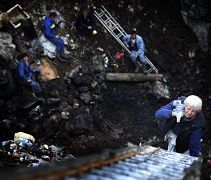
[Image: Reuters]
December 30, 2000: Investigators expected
to find up to 150 bodies of Bosnian Muslim
civilians under burning garbage in a more
than 50-meter deep pit which served as
local dump.
December 1, 2000 - Forensic experts were looking for up to 150 bodies of Muslim civilians, believed to have been killed by Serb forces in 1992, in a garbage pit at Novakusa in southern Bosnia. The victims were executed in the village of Sehovina and thrown into a pit at nearby Lipovaca. Exhumation work had started a year earlier after some remains were found.
December 4, 2000 - Forensic experts exhumed 16 bodies of people killed during the Bosnian war from a sand bank of the Drina River on the border with Serbia. The bodies were of Bosnian Muslims killed by Serb forces at the beginning of the 1992-95 war. Over 20,000 remain missing — of which 90 percent are Bosnian Muslims. More bodies were expected to be exhumed from the same site.
December 7, 2000 - At a garbage dump near Nevesinje — 41 miles south of Sarajevo — investigators believed at least 60 people were buried in another mass grave. The bodies were believed to be those of local Bosnian Muslims, killed by Serb forces at the beginning of the 1992-95 war.
December 11, 2000 - A Serbian court convicted nine Serbs of abducting former Bosnian Serb police officer Stevan Todorovic in September 1998 and smuggling him to neighboring Bosnia, where he was later arrested by NATO and delivered to the international war crimes tribunal in The Hague. They were sentenced to prison terms of up to 81/2 years. The prosecution asserted the defendants were paid US$22,700 for the abduction. The court concluded they acted on orders and were paid for by the NATO-led peace force in Bosnia.
Todorovic's arrest has become a test case for war crimes court. His challenge delayed his trial and strained the tribunal's relationship with NATO after the court subpoenaed a US and another alliance commander, ordering them to disclose details of Todorovic's detention.
December 13, 2000 - Stevan Todorovic admitted to war crimes. He also dropped complaints that he was arrested illegally. Under the plea bargain, prosecutors agreed to withdraw 26 counts including torture, sexual assaults and murder in exchange for Todorovic's guilty plea on a single count of persecution as a crime against humanity. He originally pleaded innocent in 1998.
In Croatia, public concern grew over the possibility that some prominent Croats were about to be indicted by the tribunal for the deaths of Serbs. Some media reports said that the tribunal prepared to charge Croatian generals for atrocities against Serbs in connection with the 1995 offensive in which Croatia recaptured areas seized by Serbs in 1991.
December 14, 2000 - Former French military chief Admiral Jacques Lanxade denied allegations that a French general who led UN peacekeepers during the Bosnian war had agreed to block air strikes against Bosnian Serbs, who later massacred thousands of Bosnian Muslims. About 30,000 Muslim refugees fled to the UN-declared "safe haven" of Srebrenica to seek protection from Dutch peacekeepers. But on July 11, 1995, the Serb army launched its assault with an overwhelming force and the Dutch UN troops could do little more than look on as the Serbs deported the Muslims. NATO never responded to repeated Dutch requests for airstrikes.
December 15, 2000 - Yugoslavia and Bosnia established diplomatic relations, almost nine years after Bosnia broke away from the old socialist Yugoslav federation in bloodshed.
December 16, 2000 - In Bosnia-Herzegovine a new president and parliament of the Bosnian-Serb part were sworn in.